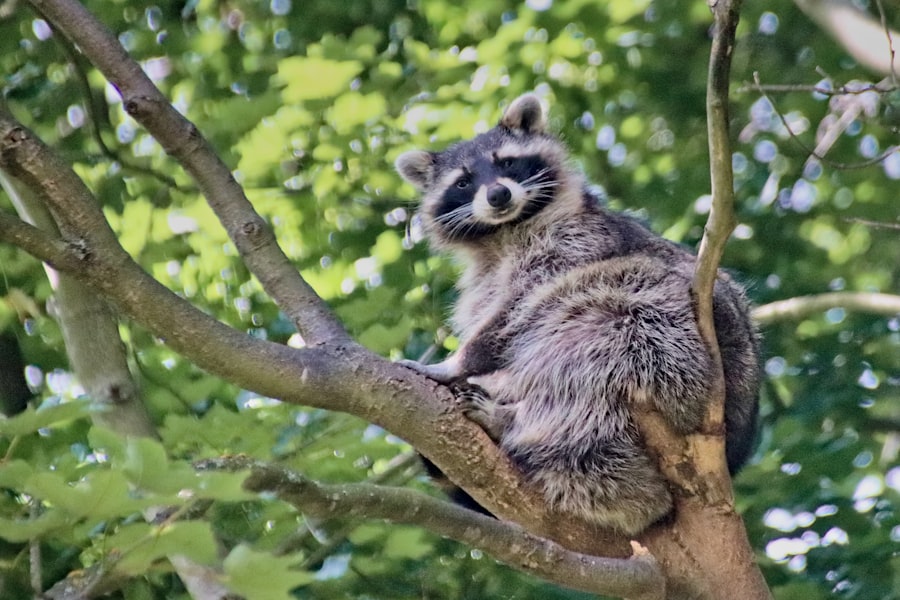Raccoons are notorious for their mischievous behavior and their tendency to raid chicken coops. If you are a chicken owner, it is important to take the necessary steps to protect your flock from these clever and determined creatures. Raccoons can cause significant damage to your chickens and their eggs, and can even pose a threat to their safety. In this article, we will explore various methods and strategies for keeping raccoons away from your chicken coop, ensuring the well-being of your feathered friends.
Key Takeaways
- Raccoons are intelligent and adaptable animals that can pose a threat to backyard chicken coops.
- Building a secure chicken coop and installing a raccoon-proof fence are effective ways to prevent raccoon attacks.
- Removing attractive food sources, using motion-activated lights and alarms, and employing natural deterrents can also help deter raccoons.
- Trapping and relocating raccoons should only be done by professionals and as a last resort.
- By taking preventative measures and seeking professional help when necessary, backyard chicken owners can protect their flock from raccoon attacks.
Understanding the Nature of Raccoons
To effectively protect your chickens from raccoons, it is important to understand their behavior and habits. Raccoons are highly intelligent and adaptable creatures. They are primarily nocturnal, which means they are most active during the night. Raccoons are omnivores, meaning they eat both plants and animals. They have a keen sense of smell and are attracted to food sources, making chicken coops an enticing target.
Raccoons are skilled climbers and can easily scale fences and walls. They have dexterous paws that allow them to manipulate objects and open doors or latches. Their natural curiosity drives them to explore new environments, making chicken coops an interesting and potentially rewarding venture for them. Understanding these traits will help you in implementing effective strategies to keep raccoons away from your chickens.
Building a Secure Chicken Coop
One of the most important steps in protecting your chickens from raccoons is building a secure chicken coop. The coop should be constructed using sturdy materials that cannot be easily broken or damaged by raccoons. Use hardware cloth with small mesh size instead of chicken wire, as raccoons can easily tear through chicken wire.
Ensure that all openings, such as windows or vents, are securely covered with hardware cloth. Raccoons have nimble fingers and can easily pry open doors or windows that are not properly secured. Use strong locks or latches to prevent raccoons from gaining access to the coop.
It is also important to consider the design of the coop. Avoid placing perches or branches near the coop that could provide raccoons with a launching point to jump onto the roof. Trim any overhanging branches that could give raccoons easy access to the coop. By building a secure chicken coop, you can greatly reduce the risk of raccoon attacks.
Installing a Raccoon-Proof Fence
In addition to a secure chicken coop, installing a raccoon-proof fence around your chicken coop can provide an extra layer of protection. The fence should be at least six feet tall and extend at least one foot underground to prevent raccoons from digging underneath it. Use sturdy materials such as metal or wood, as raccoons can easily chew through plastic or weak wire fences.
Consider using electric fencing as an effective deterrent against raccoons. Electric fencing delivers a mild shock when touched, which can startle and deter raccoons from attempting to climb over or dig under the fence. Make sure to follow the manufacturer’s instructions for installing and maintaining electric fencing to ensure its effectiveness and safety.
Removing Attractive Food Sources
Raccoons are attracted to food sources, so it is important to remove any potential food sources from your property that may be attracting them to your chicken coop. This includes securing garbage cans with tight-fitting lids, as raccoons are notorious for rummaging through trash in search of food. Store pet food indoors or in sealed containers, as raccoons will not hesitate to help themselves to an easy meal.
Keep your property clean and free of debris, as raccoons may be attracted to fallen fruits or vegetables in your yard. Regularly clean up any spilled birdseed or other food sources that may be attracting raccoons. By removing these attractive food sources, you can reduce the likelihood of raccoons being drawn to your property.
Using Motion-Activated Lights and Alarms

Motion-activated lights and alarms can be effective deterrents against raccoons. Raccoons are nocturnal animals and are startled by sudden bright lights or loud noises. By installing motion-activated lights around your chicken coop, you can startle raccoons and discourage them from approaching.
Similarly, motion-activated alarms can be used to deter raccoons. These alarms emit loud noises when triggered by motion, scaring away raccoons and alerting you to their presence. Place these alarms strategically around your chicken coop to create a deterrent effect.
Employing Natural Deterrents
Natural deterrents can also be effective in keeping raccoons away from your chickens. Raccoons have a strong sense of smell, so using strong-smelling substances can deter them from approaching your coop. Some natural deterrents include ammonia-soaked rags, predator urine, or strong-smelling herbs such as mint or lavender.
You can also try planting prickly or thorny plants around your chicken coop to create a physical barrier that raccoons will be reluctant to cross. Examples of such plants include rose bushes or holly bushes. These natural deterrents can help discourage raccoons from approaching your chickens.
Trapping and Relocating Raccoons
If all else fails and you continue to have issues with raccoons despite your best efforts, trapping and relocating them may be necessary. It is important to check local laws and regulations regarding trapping and relocating wildlife, as it may be illegal or require a permit in some areas.
When trapping raccoons, use live traps that are specifically designed for capturing raccoons safely and humanely. Bait the trap with food that is attractive to raccoons, such as canned cat food or sweet fruits. Once the raccoon is trapped, relocate it to a suitable location far away from your property, preferably in a wooded area where it can find a new home.
Seeking Professional Help
In some cases, dealing with raccoons may require professional help. If you are unable to effectively deter or remove raccoons from your property, it may be necessary to seek the assistance of a reputable wildlife removal company. These professionals have the knowledge and experience to safely and humanely remove raccoons from your property.
When choosing a wildlife removal company, do your research and look for companies that are licensed and insured. Ask for references and read reviews from previous customers to ensure that you are hiring a reputable company. A professional wildlife removal company can help you address raccoon issues effectively and provide guidance on preventing future infestations.
Protecting your chickens from raccoons is essential for their safety and well-being. By understanding the nature of raccoons and implementing various strategies such as building a secure chicken coop, installing a raccoon-proof fence, removing attractive food sources, using motion-activated lights and alarms, employing natural deterrents, trapping and relocating raccoons when necessary, and seeking professional help if needed, you can greatly reduce the risk of raccoon attacks on your chickens. Take action today to ensure the safety of your flock and enjoy the peace of mind that comes with knowing they are protected from these clever and determined creatures.
If you’re looking for more tips on keeping your chickens safe, you might find this article on chicken coop interior ideas helpful. It provides creative and practical suggestions to optimize your coop’s layout and design, ensuring a secure and comfortable environment for your feathered friends. From nesting boxes to perches, this article covers it all. Check it out here.
FAQs
What are raccoons?
Raccoons are medium-sized mammals native to North America. They are known for their distinctive black mask-like markings around their eyes and their ringed tails.
Why do raccoons kill chickens?
Raccoons are opportunistic predators and will kill chickens for food. They are attracted to the smell of chickens and their eggs.
What are some signs that raccoons are killing my chickens?
Signs of raccoon predation on chickens include missing birds, feathers scattered around the coop or yard, and bite marks on the neck or head of the chickens.
What are some ways to keep raccoons from killing my chickens?
Some ways to keep raccoons from killing chickens include securing the coop with sturdy fencing and locks, using motion-activated lights and alarms, removing food sources from the area, and using live traps to relocate raccoons.
Are there any natural predators of raccoons?
Natural predators of raccoons include coyotes, bobcats, and large birds of prey such as eagles and owls.
Can raccoons carry diseases?
Yes, raccoons can carry diseases such as rabies, leptospirosis, and salmonella. It is important to avoid contact with raccoons and to properly dispose of any dead animals found on your property.
What should I do if I find a raccoon in my chicken coop?
If you find a raccoon in your chicken coop, do not approach it. Call a professional wildlife removal service to safely remove the raccoon from your property.
Meet Walter, the feathered-friend fanatic of Florida! Nestled in the sunshine state, Walter struts through life with his feathered companions, clucking his way to happiness. With a coop that’s fancier than a five-star hotel, he’s the Don Juan of the chicken world. When he’s not teaching his hens to do the cha-cha, you’ll find him in a heated debate with his prized rooster, Sir Clucks-a-Lot. Walter’s poultry passion is no yolk; he’s the sunny-side-up guy you never knew you needed in your flock of friends!







